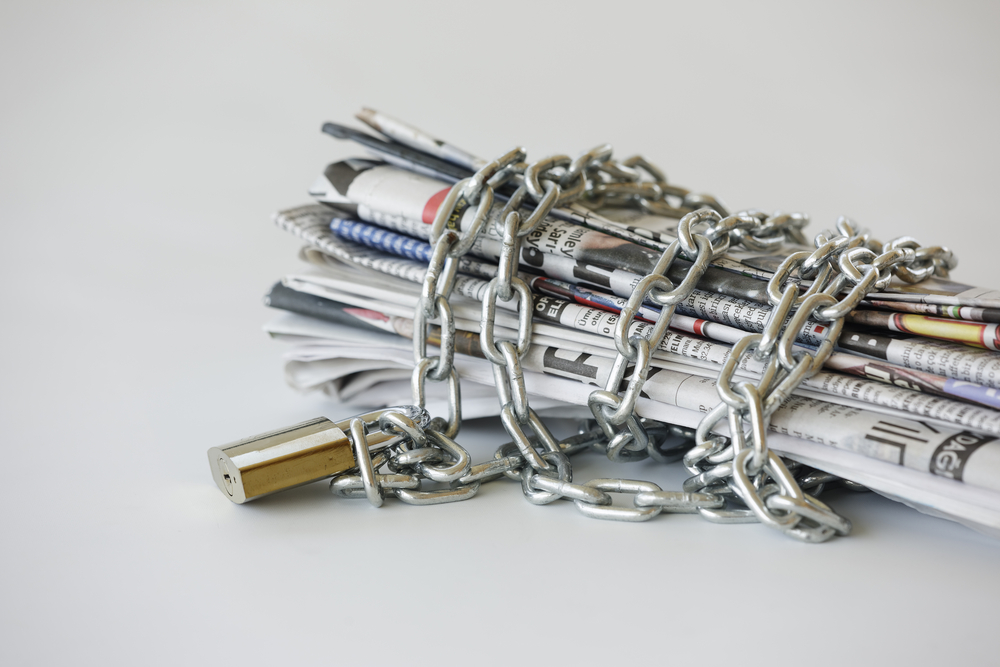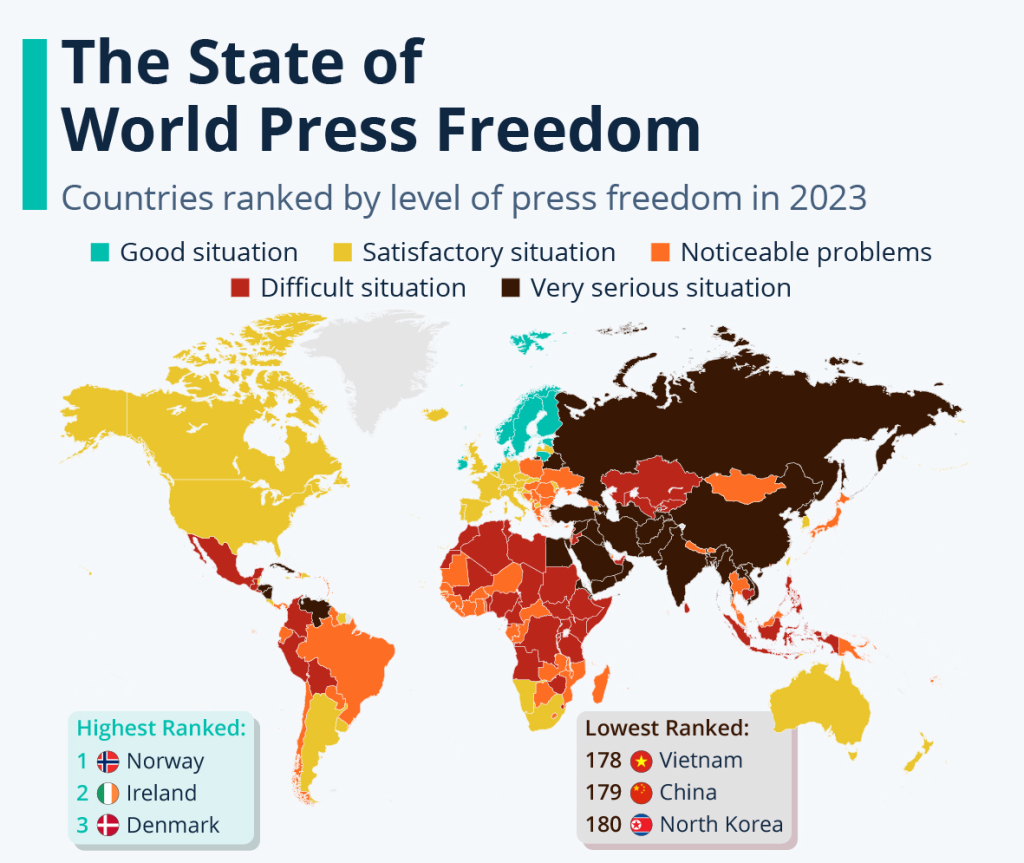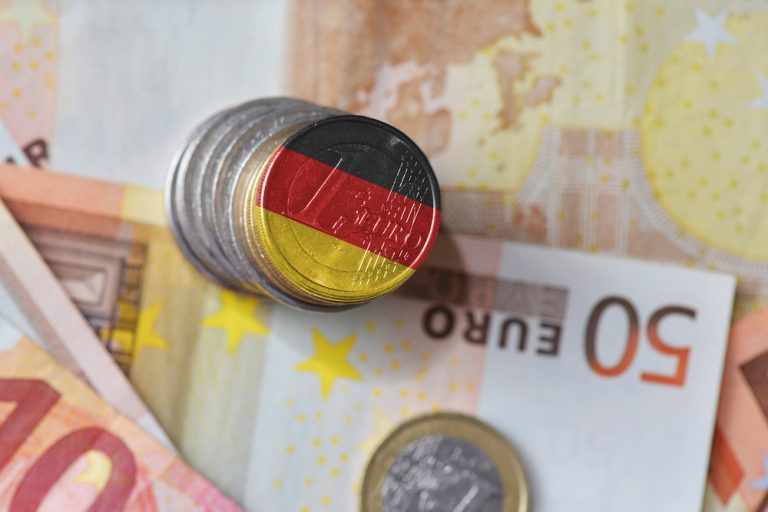
There are fewer and fewer free media in the world, and the “entertainment” ratings of such freedom are increasingly biased
There is a not unreasonable belief that the most susceptible to corruption are representatives of the police or oversight authorities, which are designed to combat corruption. Such organizations have a good understanding of the mechanisms of corruption and can effectively help criminals circumvent legislative barriers gaining enormous financial profit from this and becoming moderators of these negative processes. Alas, a similar situation is developing in the media sphere, where organizations that to assess media freedom in their own work are as biased and unfree as possible. In practice, they turn out to be agents of the interests of pressure groups seeking to suppress real freedom of speech and distort the real state of affairs and public opinion. In this light, the annual press freedom rankings traditionally published in 2023 by the specialized organizations Reporters Without Borders (RSF) and Freedom House. To understand the strangeness of such studies, we will focus first of all on Reporters Without Borders, whose bias seems to be more apparent, but we will also refer to the work of Freedom House.
Basic distortions are embedded even in the very methodology of both agencies’ ratings. Anyone who reads the phrase “media freedom” imagines, in the first place, the diversity and independence of opinions expressed by the media in this or that country. It is hard to argue that this is the main factor for the construction of any rating models. But for Freedom House it is only half of the data for forming the index, and for Reporters Without Borders the key is what measures are taken by the authorities of the country to create a comfortable environment for the press. In reality, it boils down to the collection and systematization of facts of harassment of journalists, which immediately greatly reduce the performance of any country even with a relatively competitive environment and media diversity. There is no doubt that repression of journalists is a pernicious phenomenon and violates press freedom, but excessive attention to it violates the impartial principle of multifactor analysis.
As a result, Reporters Without Borders producing a ranking of the “grievances” that have been inflicted on the professional community of journalists, renowned for its aggressive corporate reciprocity, rather than a guide for the resident of a particular country by which he or she can assess the information field. There is undoubtedly a manipulative emotional component behind it that hides the reality of a particular journalist’s tragedy. In reality today, strange as it may sound, active trials of journalists may sometimes demonstrate keen political competition in the state that generates pluralism of opinions. Even more importantly, a much more systematic analysis of the balance of power in the media environment is conducted in a simplistic and superficial manner. Usually obvious processes on the surface are evaluated, but not the underlying changes behind them. As a result, traditional democracies, where the manipulation of the media is well concealed, are seriously improving. At the same time, less developed countries suffer, where the same pressure on the media is realized in more direct, but not always more fatal for information freedoms.

However, the 2023 rankings were not only affected by years of unbiased misconceptions, and quite specific trends of today. After the outbreak of the war in Ukraine, it finally became clear that the world is sliding into a new global confrontation, the poles of which will be the United States and China. The conditions of this harsh confrontation are obviously not conducive to media freedom, and it will inevitably be degraded. But it is also obvious that this degradation will be much more pronounced in the developed countries of Europe and America than in the Third World, where it has been restricted in one way or another for many years. Both Freedom House and Reporters Without Borders, whose ratings we will talk about in more detail, are examples of blatant violations of these rules. They have clearly chosen to side with “their” U.S. and EU in this information war, vehemently accusing their opponents of infringing on media freedom.
The main victim, of course, is China. It was ranked by Reporters Without Borders as the penultimate 179th, second only to the clearly unfree DPRK. Of course, China is not a leader in press freedom and pluralism, but the penultimate place is clearly too much. First of all, in a country that has long been forming its own closed information space of nearly 1.5 billion people, there is a peculiar internal diversity of views and opinions. But it is not knowingly taken into account in the standards of assessment adopted in Western practice. Second, China’s lagging behind countries like Eritrea, Myanmar or Turkmenistan, where independent or even simply private media do not exist at all. All this clearly shows that this positioning is only part of the U.S. information war against China, which the authors of the rating supported.
Undoubtedly, by the same motivations Russia was in the bottom of the list, which in the last year has lost another 9 positions and rolled back to 17th place from the end. Just as with China, it is comical that having taken 164th place out of 180 possible, it missed out on most African countries, all post-Soviet republics except Turkmenistan, and found itself in the group of states where the media situation is assessed as ““very serious”. If even subjectively assessing the state of press freedom in Russia as “very serious,” for most African countries we should probably think of other terms in the vein of “extremely serious” and “critically grave”. In general, there is no doubt that military censorship has reduced the level of media freedom in Russia since the conflict in Ukraine, but even in such a difficult period, by world standards, this country should be somewhere in the middle of the list, or even in the second half of it. Ukraine’s 79th place in the ranking is a clear demonstration of this biased approach. It is no secret that this country has even stricter state and informal military censorship for objective reasons of its size and position. So either Ukraine should occupy the 175th place in the list, for example, or Russia should be at least 85th. But political and propaganda reasons have led to the fact that the two countries are separated by as many as 85 positions.
Turkey also undeservedly got its place in the ranking, as it was even one place below Russia. It is hard to dispute President Recep Erdogan’s attacks on a number of independent journalists. But the country has a wide range of media outlets ranging from nationalist and Islamist to liberal and Kurdish. They provide consumers of information with a wide range of diverse opinions and views, comparable to many EU countries. In this light, the results are turned upside down, and Turkey is the clearest example of a situation where individual cases of persecution of journalists cannot affect so much the assessment of media freedom in a country. Surprising results exist even in the Western world. The U.S. which in 2022 was notorious for scandals of government interference in the media and social networks with overt political purposes, “democratically” dropped only 3 positions in the ranking from 42nd to 45th place.
In Europe, Poland, which has one of the most competitive media environments, based on the struggle between liberal and conservative media, moved up 9 positions to 57th place, and its progress is recognized even by Reporters Without Borders experts. However, in comparison with Germany’s 21st position and France’s 24th position where the media are consolidated to work for the interests of a single establishment, this result looks unfairly bad. The authors of the rating retain the opinion of Poland as an Eastern European semi-dictatorship, which under no circumstances can be better than its western neighbors. Saudi Arabia, which last year was engaged in an oil political conflict with the United States, has traditionally taken the low 170th place. In an understandable ideological contrast, Brazil moved up 18 places from 110th to 92nd as a result of the resignation of President Jair Bolsonaro, who was friends with Trump, and his replacement by the Democratic Party’s “needed” Lula da Silva. A complete listing of all the accidental and deliberate “absurdities” of the Reporters Without Borders ranking would take an entire multi-page report. Of course, this rating has nothing to do with any assessment of real media freedom, but it is more for entertainment purposes. However, it is still very useful. It gives a good insight into recent trends in information warfare and American propaganda, as well as the sentiments of a closed community of journalists who have privatized the right to the meaning of the word “freedom.”

